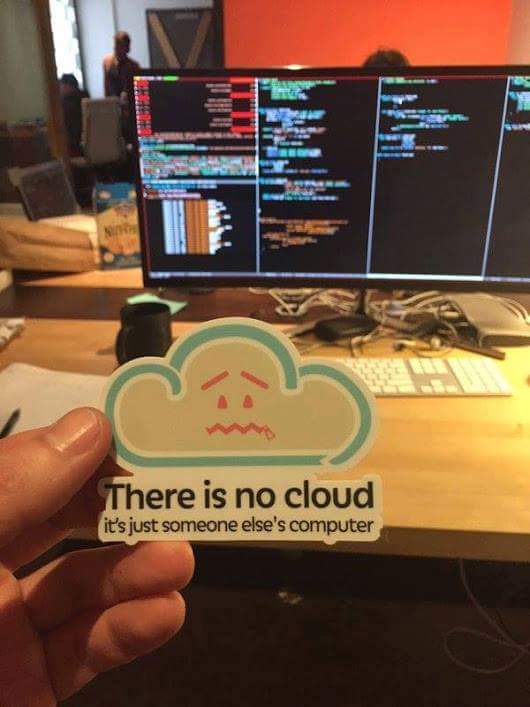Ranter
Join devRant
Do all the things like
++ or -- rants, post your own rants, comment on others' rants and build your customized dev avatar
Sign Up
Pipeless API

From the creators of devRant, Pipeless lets you power real-time personalized recommendations and activity feeds using a simple API
Learn More
Comments
-
 spongessuck6001219d"Just push your app up. Don't worry about the servers." That's pretty valuable to some folks.
spongessuck6001219d"Just push your app up. Don't worry about the servers." That's pretty valuable to some folks. -
 max19931311219dMost of the things in our industry show up again and again under different names, but still the same.
max19931311219dMost of the things in our industry show up again and again under different names, but still the same.
Cloud is a modern mainframe. -
 ars13613219dIf you’re a dev, you know what the tool does. If you don’t, you study. The buzzword is only an issue when you have a bunch of clueless managers or junior devs pushing for it because it’s THE NEW THING! But if that happens, you have bigger problems than the tech.
ars13613219dIf you’re a dev, you know what the tool does. If you don’t, you study. The buzzword is only an issue when you have a bunch of clueless managers or junior devs pushing for it because it’s THE NEW THING! But if that happens, you have bigger problems than the tech. -
 Oktokolo12341219dWait, wasn't that "serverless" buzzword not an alias for compute cloud with automatic provisioning?
Oktokolo12341219dWait, wasn't that "serverless" buzzword not an alias for compute cloud with automatic provisioning? -
 IntrusionCM15177218dTerm is misleading.
IntrusionCM15177218dTerm is misleading.
Server less is meant as no need for planning, maintenance, fault tolerance etc.
Though (insert Pepperidge Farm meme here)...
I still have extreme concerns regarding that and cloud in general.
Smaller applications or isolated applications work well with the idea.
Anything else ... not so much.
Before anyone starts arguing, I'd recommend looking at the fuck ups of e.g. Microsoft, Amazon, OVH (burning data centers with no fault tolerance anyone? ;) )... and at the fun you have regarding not to worry about scaling and maintenance, except you have to very much worry about that.
Plus the worries regarding legal issues, red tape, settings, credentials, backups, ... -
 jiraTicket2263218dServerless as a term annoys people - but it's also widely known it's a misnomer (it's still just servers) so if we just accept that and think of it as a new term that could be called something else we can actually start talking about what it normally entails.
jiraTicket2263218dServerless as a term annoys people - but it's also widely known it's a misnomer (it's still just servers) so if we just accept that and think of it as a new term that could be called something else we can actually start talking about what it normally entails.
One example as far as I understand is the scaling in pricing model
In general
* Serverless - you cannot control how many servers you reserve. You pay by usage. If a request comes - it will be handled somehow by an unknown amount of servers.
* Cloud - you can reserve a specific amount of servers somewhere. And pay for those.
* Oldschool Server - a specific physical machine
As a practical example a company using oldschool servers might have had two physical machines with 8GB mem in Ireland, the moved to Cloud and reserved two servers with 8GB memory somewhere and pay for those per month. Then moved to serverless and now they pay by usage -
 max19931311216dAnd since most websites run with less than 2.5 mil RPM, technically a single instance could handle all the traffic.
max19931311216dAnd since most websites run with less than 2.5 mil RPM, technically a single instance could handle all the traffic.
So all the overhead is just bloat, which waste money.
Related Rants

 I found the rig of the year.
I found the rig of the year. When people find out the hard truth
When people find out the hard truth
The term "serverless" has been popping up more and more in the tech industry, boasting the benefits of not having to manage servers and providing a more cost-effective solution for businesses. However, if we take a step back and think about it, isn't this just a marketing ploy?
The reality is, serverless software has been around for decades. Before the cloud became a popular option, we had software that could be installed and run locally on our computers without the need for managing servers. This was essentially serverless technology, but it just wasn't called that.
Now, with the rise of cloud computing, companies are trying to capitalize on this buzzword by promoting their products as "serverless", even though they still rely on servers in some way. It's almost laughable that we are being sold on a concept that has been around for so long.
In addition, the term "serverless" also gives the impression that there are no servers involved at all, when in reality, there are still servers powering these cloud services. It's just that the responsibility of managing them now falls on the cloud provider instead of the business.
The truth is, serverless technology is not new. It's just a rebranded, hyped-up version of what we've already had before. Instead of constantly chasing after the latest buzzword, we should focus on the actual benefits and capabilities of a technology, and not let ourselves be swayed by clever marketing tactics.
So, let's not get caught up in the serverless hype. Let's remember that we've had this technology for a long time, and instead of focusing on the label, let's focus on the functionality and value it can provide to our businesses.
devrant
serverless
cloud